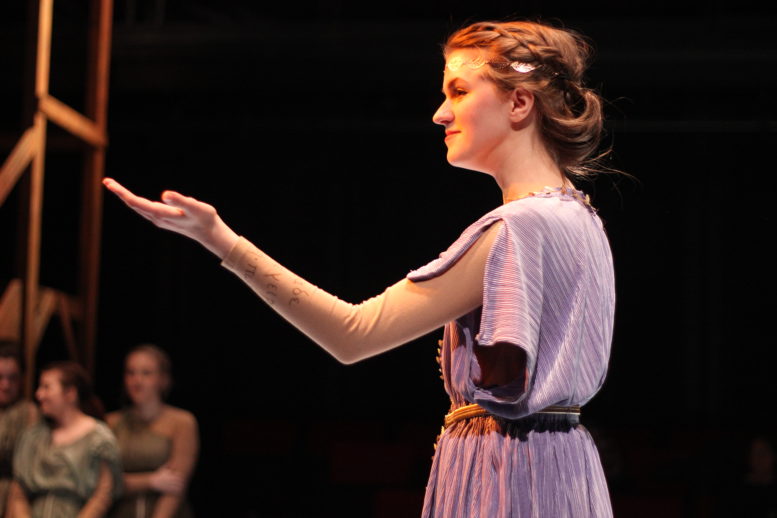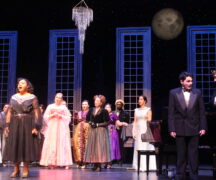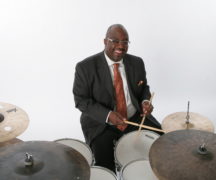By DAVID DUPONT
BG Independent News
“The Penelopiad” is a woman’s take on the testosterone-fueled tales told in “The Iliad” and “The Odyssey.”
Given women’s place in the ancient societies that spawned these myths, we shouldn’t be surprised that Margaret Atwood should set her tale in hell, or the Greek version, Hades, more a place of internal torment than physical pain.
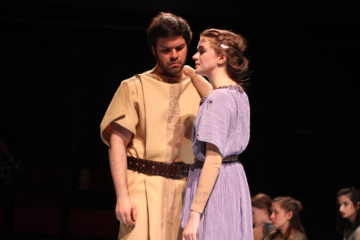
Jarod Mariani and Katya Dachik as Odysseus and Penelope
“The Penelopiad” directed by Sara Lipinski Chambers, opens in the Eva Marie Saint Theatre on the Bowling Green State University campus tonight (Thursday, Feb. 16) and continues weekends through Saturday, Feb, 25. (See details below.)
Through Penelope (Katya Dachik), the legendary faithful wife, we learn the other side of the story of Odysseus and his return home after 20 years of war and wandering. We see his vengeance not as triumph but as tragedy. As with any Greek tragedy the plot is fueled by a central fault in our central character. Penelope believes she can somehow control the patriarchy that closes in on her life – her father, her husband, her in-laws, the controlling servant, and the suitors lusting for her body and more so her husband’s patrimony. But then that frail belief is all she has to cling to.
Using the wiles her husband is famous for, she conspires to hold the unwelcomed suitors at bay only to bring death to those who aided her. But then Odysseus (Jarod Mariani) came home alone, his crew’s bodies strewn across the Aegean in a trail leading back to the bloody fields of Troy.
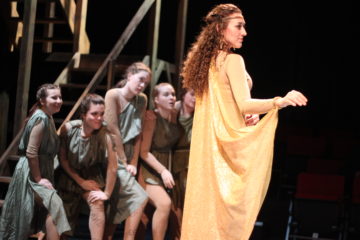
Sarah Drummer as Helen
“The Iliad” and “The Odyssey” are tales of war told by the victors. Though men so often use women as a pretext for war, women are almost never among the victors, no matter what side their husbands, fathers, lovers, and sons fought on.
This is a dark play. The stage thrusts into the audience seated in close quarters on three sides. We are observers in Hades as Penelope tells of her own mythic birth and an upbringing where she was never sure if her father might not pitch her off a cliff – he did try to murder her as an infant. She tells of how Odysseus was chosen as her mate. As was his wont he cheated to best his rivals for her hand in a footrace that determined her fate.
He proves a surprisingly loving husband. Mariani’s Odysseus has great charms that are at one with his deceptive nature. But her life in the court in his native Ithaca is not an easy one, as she is kept at distance from her son Telemachus (Jabri Johnson) by her husband’s beloved maid, the domineering Eurycleia played with a steely demeanor by Nicole Tuttle. Penelope is alone with no one of her age or station to keep her company.
Most of the characters in this drama are played by a chorus of maids, who shape-shift as needed into male and female figures. The dozen actresses embody the maids, who are the victims of the suitors’ sexual rapaciousness, and the suitors themselves. They play royalty and those in society’s gutter. Sarah Drummer plays Melantho, who is cursed to be the most fair and beautiful and therefore the particular target of the suitors. She also plays the beautiful Helen of Troy, a temptress even in Hades.
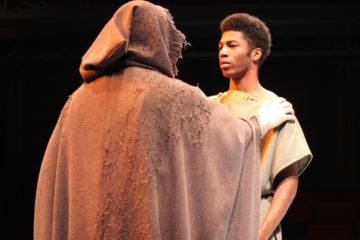
Telemachus played by Jabri Johnson greets his father disguised as a beggar.
These maids we are told are “a motley and piebald collection” of women — slaves, orphans, abandoned daughters, war bounty. They are powerless, yet Penelope uses them to achieve what little power she has, and with them finds the rare glow of friendship, a relief from her life of isolation.
Atwood makes the radical gesture of giving each of these otherwise anonymous women a name, which Penelope utters as she summons them to join her plot to keep the marauding suitors at bay.
They are not an anonymous chorus, rather each has a personality and a voice within the collective. The maids are played by: Anna Randazzo, Miranda Harmon, Ali Kulbago, Camila Pinero, Madison Zavitz, Missy Snyder, Rachael Kuecher, Paige Dooley, Libby Zamiska, Caterina Cundari, and Baylee Sheets.
Their stately and swirling dances and singing of songs that relate Odysseus’ tale and set the emotional mood and the context. Truman Chambers set Atwood’s lyrics to music, with a droning guitar in the place of the ancient lyre.
The play is never still. The actors are in constant motion, like shades in Hades. They are haunted by the lives they led, by their fates.
At the center is Dachik’s Penelope. Dachik brings out all the shadings of the character, including her brief sense of marital bliss and the warmth of her companionship with the maids, as well as a certain blindness to the toll their deception takes on them.
For Penelope Hades is just a continuation of her earthly existence. She has no more agency in the afterlife than she did in life. She did her best, but it led to the worst.
Yet she is a legend. She is the model for the ages of the faithful wife, or as she puts it, “a stick to beat other women with.” Her advice is: Don’t follow my example. But we will follow this powerful rendering of her story to hell and back.
Times & tickets
“The Penelopiad” will be presented in the Eva Marie Saint Theatre in the Wolfe Center for the Arts Thursday, Friday and Saturday at 8 p.m. with matinee at 2 p.m. Saturday and Sunday. The play continues Feb 23-25 at 8 p.m. and Feb. 25 at 2 p.m. Advance tickets are $15 and can be purchased at the box office in the Wolfe Center, 419-3728171 or online at www.bgsu.edu/arts. All seats the day of the performance are $20.

